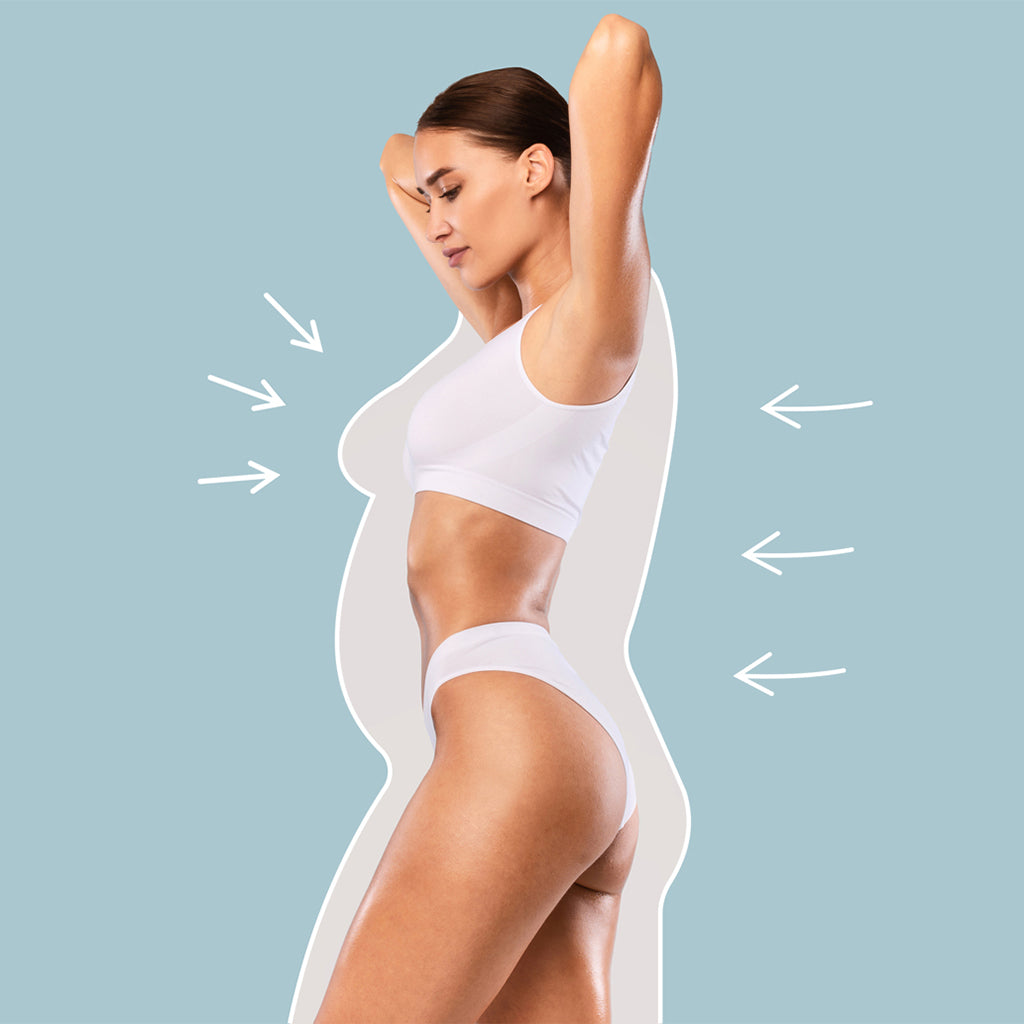Skin may naturally tighten after weight loss, but it largely depends on various factors. Age, genetics, and the amount of weight lost play crucial roles.
Losing weight can be an exhilarating achievement. However, many people worry about loose skin after shedding those extra pounds. Skin elasticity diminishes with age, making it less likely to bounce back. Genetics also influence how well your skin can tighten.
Rapid weight loss often leaves more loose skin compared to gradual weight loss. Maintaining a healthy lifestyle, including proper hydration and nutrition, can aid in skin tightening. Exercise, particularly strength training, can also improve skin appearance. Understanding these factors helps manage expectations and develop effective strategies for dealing with loose skin after weight loss.

Credit: www.boustise.com
Will Skin Naturally Tighten After Weight Loss
After losing weight, many people wonder if their skin will tighten naturally. This question arises because loose skin can be a common issue post-weight loss. Let’s explore how skin elasticity works and what factors affect skin tightening.
Introduction To Skin Elasticity
The skin is an elastic organ. It stretches and contracts based on body changes. Skin elasticity refers to the skin’s ability to return to its original shape. This ability is crucial for skin tightening after weight loss.
Collagen and elastin are key proteins in the skin. They provide structure and flexibility. As we age, the production of these proteins decreases. This affects the skin’s ability to tighten after weight loss.
Factors Affecting Skin Tightening
Several factors influence how well the skin tightens after weight loss. Here are some important ones:
| Factors | Description |
|---|---|
| Age | Older skin has less elasticity due to lower collagen and elastin levels. |
| Amount of Weight Lost | Significant weight loss can result in more loose skin. |
| Duration of Overweight | Long-term overweight stretches the skin more, affecting its ability to rebound. |
| Genetics | Genetic factors play a role in skin elasticity and recovery. |
| Sun Exposure | Excessive sun exposure damages skin cells, reducing elasticity. |
| Nutrition | A balanced diet supports healthy skin and elasticity. |
| Hydration | Well-hydrated skin maintains better elasticity. |
These factors can determine how well your skin adapts post-weight loss. Younger individuals with minimal sun damage and good hydration may see better results. Proper nutrition and skin care routines also aid in skin tightening.
If your skin does not tighten naturally, there are medical treatments available. Consulting a dermatologist can provide tailored advice and options.
Role Of Age And Genetics
Weight loss can lead to loose skin. Age and genetics play a big role in whether your skin will tighten up naturally. Understanding these factors can help you manage your expectations.
Impact Of Aging On Skin
As you age, your skin loses elasticity. This means it doesn’t snap back as easily. Collagen and elastin fibers break down over time. This makes the skin less firm and stretchy.
Young people have more collagen and elastin. Their skin tightens more easily after weight loss. Older people may find it harder to regain tight skin.
Genetic Predispositions
Your genes determine your skin’s natural elasticity. Some people have genes that help their skin stay firm. Others may not be as lucky. Family history can give you clues about your skin’s potential.
If your parents had tight skin after weight loss, you might too. If they had loose skin, you might experience the same. Genetics can also affect how much collagen and elastin your skin produces.
Importance Of Weight Loss Pace
Understanding the importance of weight loss pace is crucial. Losing weight too fast can affect your skin’s ability to tighten. A steady and controlled pace is often better for skin health.
Gradual Vs. Rapid Weight Loss
Gradual weight loss means losing weight slowly. This allows your skin to adjust. Rapid weight loss can leave you with loose skin. Fast weight loss doesn’t give your skin time to shrink.
Benefits Of Slow Weight Loss
Slow weight loss has many benefits. Your skin has time to tighten. You also reduce the risk of health problems.
- Improves skin elasticity
- Reduces stretch marks
- Maintains muscle mass
| Gradual Weight Loss | Rapid Weight Loss |
|---|---|
| Better skin tightening | Loose skin |
| Healthier body | Possible health risks |
Adopting a slow and steady approach to weight loss is important. This helps your skin to naturally tighten. It also supports overall well-being.
Nutritional Influence
Weight loss often leads to concerns about loose skin. Nutrition plays a key role in skin tightening. Eating the right foods can improve skin elasticity. This helps the skin to bounce back after weight loss.
Essential Nutrients For Skin Health
Several nutrients are vital for skin health. These include vitamins, minerals, and proteins.
- Vitamin C: Boosts collagen production which keeps skin firm.
- Vitamin E: Protects the skin from damage caused by free radicals.
- Protein: Essential for skin repair and growth.
- Zinc: Helps with skin healing and reduces inflammation.
| Nutrient | Sources |
|---|---|
| Vitamin C | Oranges, strawberries, bell peppers |
| Vitamin E | Almonds, sunflower seeds, spinach |
| Protein | Chicken, fish, beans |
| Zinc | Oysters, beef, pumpkin seeds |
Hydration And Skin Elasticity
Hydration is crucial for maintaining skin elasticity. Drinking enough water keeps the skin hydrated. This helps the skin stay plump and elastic.
- Drink at least 8 glasses of water daily.
- Include water-rich foods like cucumbers and watermelon.
Avoid sugary drinks and too much caffeine. These can dehydrate your skin.
Exercise And Skin Tightening
Exercise plays a crucial role in skin tightening after weight loss. Physical activity helps build muscle and boosts skin elasticity. Let’s explore how different types of exercise can aid in achieving tighter skin.
Strength Training Benefits
Strength training is essential for muscle development. It helps to replace lost fat with muscle. This results in firmer and tighter skin. Common strength training exercises include:
- Weight lifting
- Resistance band exercises
- Bodyweight exercises like push-ups and squats
Strength training boosts collagen production. Collagen is a protein that provides skin with structure and elasticity. Regular strength training can significantly improve skin firmness.
Cardio And Skin Health
Cardio exercises also benefit skin health. They increase blood circulation, delivering oxygen and nutrients to the skin. Common cardio exercises include:
- Running
- Cycling
- Swimming
Cardio helps in burning calories and reducing overall body fat. Less fat means less sagging skin. Improved blood flow from cardio exercises can enhance skin tone and texture.
| Exercise Type | Benefits |
|---|---|
| Strength Training | Builds muscle, boosts collagen, improves skin firmness |
| Cardio | Increases blood flow, burns fat, enhances skin tone |
Combining strength training and cardio exercises can maximize skin tightening benefits. Aim to include both types of exercise in your routine.
Skincare Regimens
After losing weight, many people worry about loose skin. A well-planned skincare regimen can help. This section will explore various treatments. These treatments can improve skin elasticity and appearance.
Topical Treatments
Topical treatments are easy to use. They often come in the form of creams and oils. These products can help tighten the skin.
- Retinoids: Retinoids boost collagen production. This can make the skin firmer.
- Hyaluronic Acid: Hyaluronic acid helps the skin retain moisture. This can improve skin elasticity.
- Vitamin C Serum: Vitamin C can enhance collagen synthesis. It also protects the skin from damage.
Applying these products regularly can yield noticeable results. Make sure to follow product instructions. Consistency is key for seeing improvements.
Professional Skin Treatments
Professional skin treatments offer more advanced solutions. These treatments are performed by experts. They can provide more significant results.
| Treatment | Benefits |
|---|---|
| Laser Therapy: | Stimulates collagen production. Improves skin texture and firmness. |
| Radiofrequency Therapy: | Uses heat to tighten skin. Promotes collagen and elastin production. |
| Micro-needling: | Creates tiny injuries in the skin. Stimulates the body’s healing process. |
Consulting a dermatologist can guide you to the best treatment. Professional treatments often require multiple sessions. They can be more effective than topical treatments alone.
Surgical Options
After significant weight loss, some people find they have loose skin. This can affect confidence and comfort. Surgical options are available to help tighten this skin.
Types Of Skin Tightening Surgeries
There are several types of surgeries to tighten loose skin. Each surgery targets different areas of the body.
- Abdominoplasty: This is also known as a tummy tuck. It removes excess skin from the stomach area.
- Arm Lift: This surgery removes loose skin from the upper arms.
- Thigh Lift: This procedure targets excess skin on the thighs.
- Body Lift: This surgery can address skin on the abdomen, buttocks, and thighs.
Risks And Benefits
Each surgery has its own risks and benefits. It’s important to understand them before deciding.
| Type of Surgery | Benefits | Risks |
|---|---|---|
| Abdominoplasty | Flatter stomach, improved posture | Infection, scarring |
| Arm Lift | Slimmer arms, better fit in clothes | Numbness, asymmetry |
| Thigh Lift | Smoother leg contour | Swelling, bruising |
| Body Lift | Improved body shape | Fluid accumulation, pain |
Benefits of these surgeries include improved body shape and better self-esteem. Risks can include infection, scarring, and numbness.
Consult with a qualified surgeon to discuss your options. They can help you decide which surgery is best for you.

Credit: www.wideworldcoaching.com
Expert Advice
Weight loss is a significant achievement, but it often leaves loose skin. Seeking expert advice can help you address this concern. Experts provide valuable insights on how to tighten skin naturally.
Consulting Dermatologists
Dermatologists are skin experts. They can recommend treatments and skincare routines. A professional consultation can identify the best approach for your skin type.
- Non-invasive treatments: These include laser therapy, radiofrequency, and ultrasound.
- Topical products: Dermatologists may suggest creams with retinoids or hyaluronic acid.
- Healthy lifestyle: A balanced diet and regular exercise support skin health.
Expert advice can help you find the most effective solutions.
Personal Success Stories
Real-life experiences can be inspiring. Many have successfully tightened their skin after weight loss. Here are some stories:
| Name | Method Used | Results |
|---|---|---|
| Jane Doe | Regular exercise and hydration | Improved skin elasticity within 6 months |
| John Smith | Topical creams and laser therapy | Significant tightening in 4 months |
These stories show that persistence pays off. Different methods work for different people. Finding the right combination is key.

Credit: rejuvaustralia.com.au
Frequently Asked Questions
How Long Does It Take For Skin To Tighten After Weight Loss?
Skin tightening after weight loss can take several months to two years. Factors like age, genetics, and weight loss amount influence the process. Maintaining hydration, a balanced diet, and regular exercise can help improve skin elasticity. For persistent loose skin, consult a dermatologist for professional advice and treatment options.
Can You Naturally Fix Loose Skin After Weight Loss?
Yes, you can naturally improve loose skin after weight loss. Exercise, hydration, and a balanced diet help. Massage and firming creams may also assist.
Can Loose Skin Go Back To Normal After Weight Loss?
Loose skin may tighten over time after weight loss. Factors include age, skin elasticity, and amount of weight lost.
Will Losing 50 Pounds Cause Loose Skin?
Losing 50 pounds may cause loose skin, especially if weight loss happens quickly. Age, genetics, and skin elasticity also play roles.
Conclusion
Achieving weight loss can lead to natural skin tightening over time. Factors like age, skin elasticity, and overall health play a role. Consistent hydration, a balanced diet, and regular exercise can support this process. For persistent loose skin, professional treatments may be considered.
Embrace your journey and consult experts for personalized advice.


